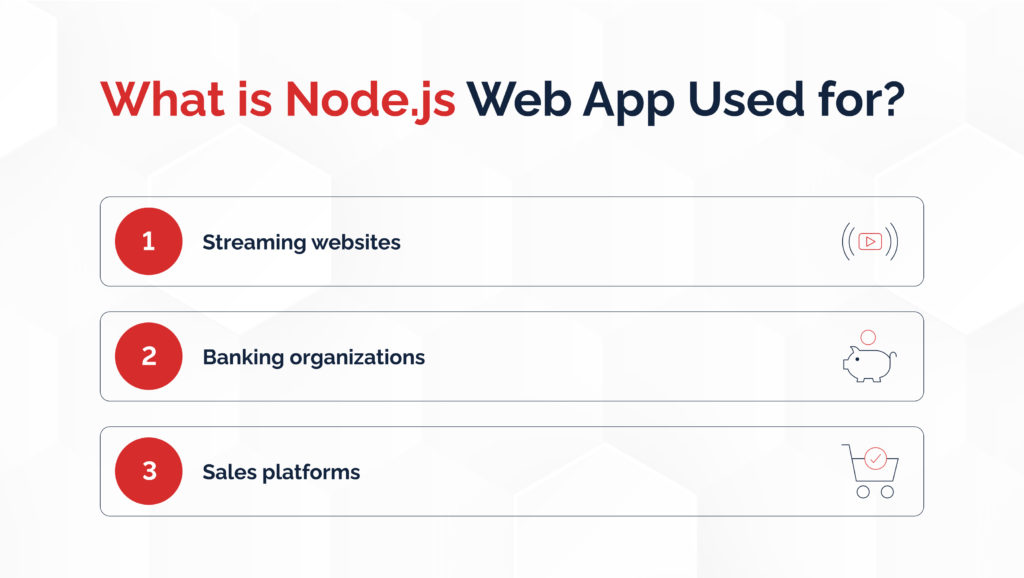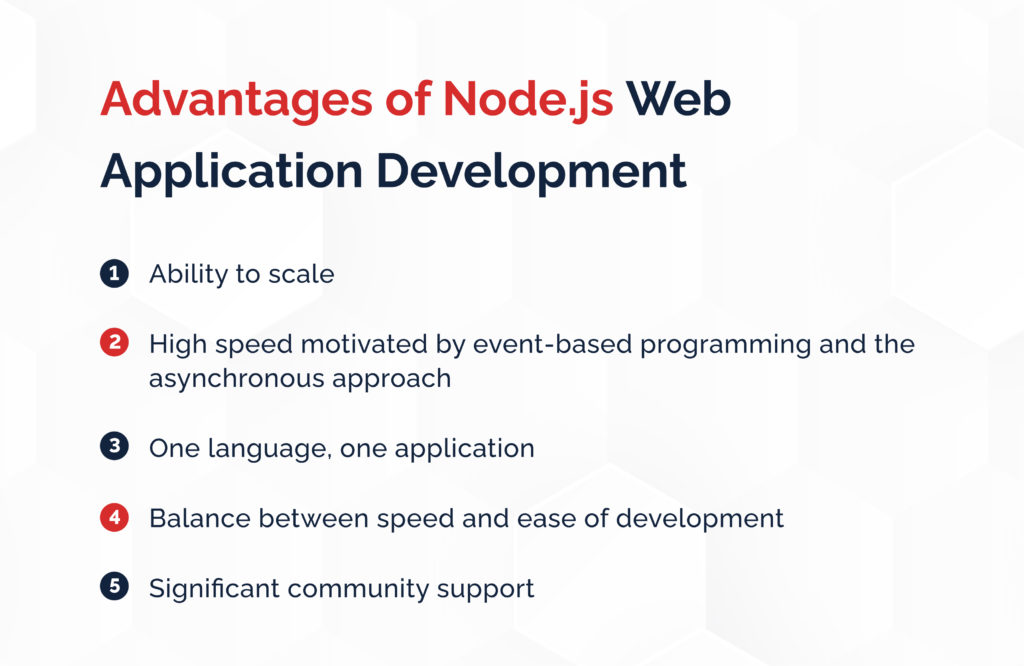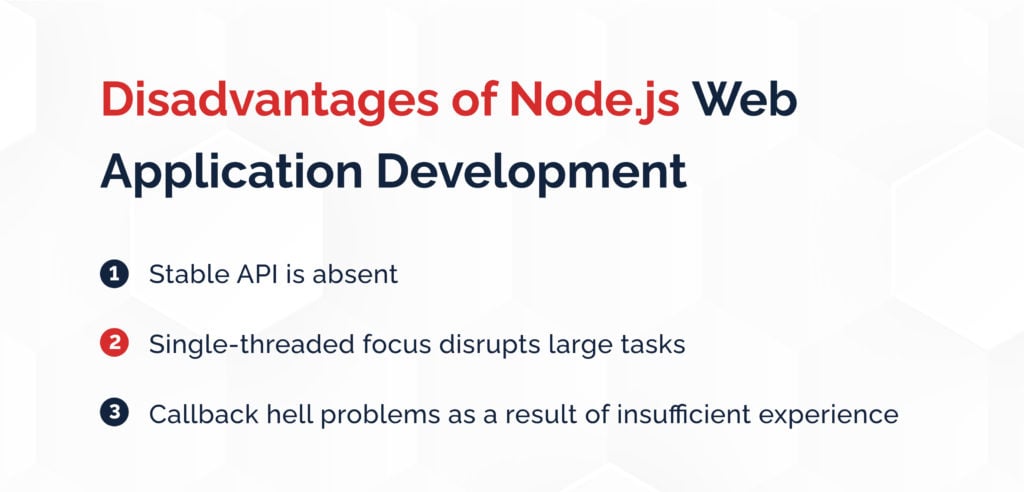Check out the main reasons for choosing Node.js web application development
Significant reasons exist to consider the use of Node.js for web app development. In this article, we’ll take a look at all of them. As you’ll find out, the platform in question may be perfect for many tasks that require client-centric projects. Its ability to combine rapid development with rather good performance is undoubtedly enticing. Are you interested in the topic and want to discover more information? You can also try reading our page about the existing Node web development efforts.
What is Node JS Web App Development?
Node.js web app development includes the focus on the runtime capabilities of the framework. A traditional approach is to use JavaScript in the frontend and some other programming languages for the backend. A web app with Node.js is markedly different. It involves the use of JavaScript both for the development of the frontend and the backend. As a result, a full-stack program comes into being via this path. This Node.js web app, obviously, tends to be much easier to maintain with a smaller workforce than the one based on the use of two languages. You’ll primarily need specialists with the knowledge of JavaScript when using such platforms. Ultimately, Node.js web app development includes a significant focus on the key capabilities of the platform.
What is Node js Web App Used for?
Node.js web application development has led to the creation of a myriad of sites. In what sectors do they function? Here are some examples:

Streaming websites: many companies that want to create sites with the focus on the promotion of on-demand video use Node.js. One of the most notable examples of such development companies is Netflix, which actively uses Node.js in many of its tasks;
Banking organizations: modern fintech finds Node.js web app options to be of great interest because they allow for the usage of a large number of concurrent requests. Thus, it’s possible to scale the relevant software to work with a very large number of customers all across the globe;
Sales platforms: Node.js web application is a choice of many international platforms for selling various products. For instance, you can find at least elements of the platform on eBay. Hence, it represents a potent way to quickly create platforms that should satisfy a large number of people.
Node.js, as you may see, presents an opportunity to gain a rather significant competitive advantage today.
The Market Share of Node JS Web Application
Node.js currently features approximately 4% market share. Considering how widespread different platforms are, this result is outstanding. It means that hundreds if not thousands of companies consider Node.js as its main development environment. If one notes that JavaScript, the basis of this runtime environment framework, is one of the most widespread platforms in the world (at least when it comes to some libraries), the use of Node.js web app becomes especially enticing. After all, it offers access to some of the most popular technologies in the world.

Pros and Cons of Node JS Web Application Development
Many pros and cons exist when it comes to Node.js. The advantages include the ability to scale, high speed in comparison to price of app development processes, and active support on the part of the community. As for the downsides, they include problems with multithreaded tasks, absence of a stable API, and the callback hell problem. Do you want to find out more about the issue? In this case, the following sections will give you all the relevant information.
Reasons (Pros) to Choose Node for JS Web App Development
Here are some of the key reasons why you should consider choosing Node.js for web app development in the modern world:

Ability to scale
Node.js web application development offers many ways for the projection of your application across a large number of instances. Node.js itself is single-threaded when it comes to the execution of one task. However, you can spread the runtime environment among multiple cores and even servers in order to work with a very large number of users. This approach offers a massive boost for development performance. Your developers won’t have to focus on the complete rewrite of the backend once your application grows. Instead, it’s possible to use the old code of the original startup program with relatively small changes. In this way, Node.js offers a solution to services that expect explosive growth but need to create a minimal viable product at first. With it, you’ll already have the program that, more or less, functions properly and would fit both a thousand and a million users across the globe.
High speed motivated by event-based programming and the asynchronous approach
Node.js has a rather interesting model of programming. App development projects follow an approach in which most tasks undergo an event-based process and launch in an asynchronous manner. Firstly, a web application using Node.js preloads most variables and other important aspects of the program and starts to listen for signals that would launch the rest of the program. In this way, many of the processes happen faster than in other important web programming languages on the market. Secondly, an asynchronous approach to program launching is essential for Node.js. Apart from focusing on the promotion of preloading (this description, however, is very simplified), Node.js also concentrates on the fast launching of software through separate loading of the relevant elements. For instance, it can load images and text in two separate instances, which are not entirely interconnected. This approach allows speeding up the loading of various programs. Instead of having to go through a sequential process, they may load in several simultaneous stages. As a result, the long-term results in terms of productivity are outstanding for the platform in question.
One language, one application
One of the biggest problems of the web app development tech stack lies in the need to focus on a wide set of software. For instance, prior to Node.js, one had to hire programmers who would have knowledge of both JavaScript and Ruby, for instance. In many cases, this problem led to the issues with code maintenance and the excessive reliance on certain people in the workforce. Node.js changes the approach once and for all, as mentioned previously. Being a runtime environment for JavaScript, the platform creates a perfect space for creating everything in one language. Building web apps with Node.js is simple, because you have to use only JavaScript. This factor means that it’s no longer crucial to hire big teams of developers. Do you have a startup with a limited number of workers? Don’t worry! Node.js can allow you to develop rather potent programs despite the relative shortage of the workforce. Therefore, the framework truly changes many of the common approaches in terms of development.
Balance between speed and ease of development
Node.js is not the fastest runtime environment out there. You can achieve better results with some traditional backend languages. The problem with them lies in the very high level of complexity behind the program development. App development technology requires knowledge of complex mathematical concepts and advanced programming techniques. As a result, the development of fast programs often becomes expensive. JavaScript also necessitates some knowledge but the overall entry barrier is lower than for other platforms. Thus, Node.js web application development offers a potent balance. On the one hand, it gives access to the platform where speed is, as mentioned previously, relatively high in the vast majority of cases. On the other hand, the platform provides an approach that enables ease of development, using one of the simplest platforms on the market. Node.js is rather fast and can produce good results in terms of productivity. The combination of these factors makes the development of various apps worthwhile in terms of funds.
Significant community support
A big factor for Node.js is that it’s supported by a rather large community of developers. In this regard, the platform has more than a million packages in its NPM repository. Other platforms feature between 200 thousand and 500 thousand packages in most tasks. Using the tremendous library available to the users, you can perform a vast variety of common web development tasks fast. Node.js web app development is, thus, very easy to complete. When you need some proof of concept, it’s easy to utilize the already existing modules. In case you need to develop something novel from scratch, many users on the forums dedicated to Node.js would be more than willing to offer their assistance with the key aspects of learning. In short, most development activities become simpler in this manner. You’ll always have someone who would be able to offer answers to the development problems you feature.
Cons of Node JS Web Application Development
Despite the great strengths, Node.js also features some significant problems that we can’t ignore in their entirety. Here are some of them:

Stable API is absent
Node.js is a piece of software that’s always in flux. The developers of the platform tend to make changes that can be disruptive from the standpoint of program functioning. As a result, the API responsible for the interaction between various pieces of software may require many rewrites during the use of the platform. Even though the tempo of updates is not debilitating, some significant application code transformations may be essential. Hence, the problems with API may lead to either the constant use of the old versions of the runtime or the need to introduce rather large changes to Node.js web app development in a vast number of cases. Thus, the platform may sometimes be imperfect if you’re searching for a way to implement maximal stability.
Single-threaded focus disrupts large tasks
Node.js is focused on the promotion of singular tasks in one thread. Yes, you can spread the instances of the program across a large number of cores and even servers. However, the problem is that a separate client request would still work with just one thread. In this light, creation of the complex processing tasks for Node.js is suboptimal. The runtime environment is simply unsuited for such tasks and makes them excessively slow. Node.js is perfect for many small connections that don’t take much resources. When it comes to one big current request, the overall advantages of the framework start to evaporate.
Callback hell problems as a result of insufficient experience
As we’ve mentioned previously, development in Node.js is rather simple. Still, some skill for an average Node.js web application example is crucial. The reason lies in the issue with the so-called callback hell. The asynchronous nature of the software depends on the nesting of callbacks across the code. It’s possible to simply create too many of them, making the management of separate elements difficult. Some ways to overcome the problem exist, indeed. They are, however, not as numerous as it may seem. Thus, to maintain the code of the software in question, it’s essential to actually pay attention to some advanced development techniques in order to prevent large-scale problems with its maintenance.
What’s there for Node JS Web App Development in the future?
The future of Node.js web app development is likely to be rather promising. The platform has been growing in popularity over the last five years. Therefore, it’s reasonable to expect that its overall level of relevance shall be potent in the upcoming years. Many large products such as Uber utilize the runtime framework and, hence, there’s a significant impetus for other developers to adopt it as fast as possible. In the future, we can expect more updates that will touch upon the problems of the platform. In this regard, it’s possible that the API stability may become one of the targets for modern developers. In the end, the developer productivity associated with the use of the platform is likely to rise in the upcoming years.
In Conclusion
To summarize, Node.js can be a solution to many of your objectives. The platform is easy to use and scale. Indeed, some disadvantages exist but they touch upon some very specific uses or the rather basic lack of skills on the part of the developers. If you want to create a strong web app, then using Node.js is a perfect option.
You can hire Node.js developers in Keenethics. So, do not hesitate to contact us to help you execute your project.

























